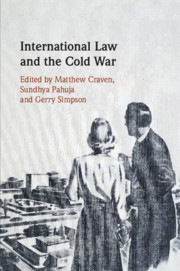52 results
4 - After Method: International Law and the Problems of History
- from Part I - Methods, Approaches and Encounters
-
-
- Book:
- History, Politics, Law
- Published online:
- 28 September 2021
- Print publication:
- 07 October 2021, pp 96-126
-
- Chapter
- Export citation
About the Authors
-
- Book:
- International Law and the Cold War
- Published online:
- 05 December 2019
- Print publication:
- 19 December 2019, pp xii-xii
-
- Chapter
- Export citation
Contents
-
- Book:
- International Law and the Cold War
- Published online:
- 05 December 2019
- Print publication:
- 19 December 2019, pp vii-ix
-
- Chapter
- Export citation
Part II - The Generative/Productive Cold War
-
- Book:
- International Law and the Cold War
- Published online:
- 05 December 2019
- Print publication:
- 19 December 2019, pp 79-336
-
- Chapter
- Export citation
Part III - The Parochial/Plural Cold War
-
- Book:
- International Law and the Cold War
- Published online:
- 05 December 2019
- Print publication:
- 19 December 2019, pp 337-581
-
- Chapter
- Export citation
Acknowledgements
-
- Book:
- International Law and the Cold War
- Published online:
- 05 December 2019
- Print publication:
- 19 December 2019, pp xiii-xiv
-
- Chapter
- Export citation
Figures
-
- Book:
- International Law and the Cold War
- Published online:
- 05 December 2019
- Print publication:
- 19 December 2019, pp x-x
-
- Chapter
- Export citation
1 - Reading and Unreading a Historiography of Hiatus
-
-
- Book:
- International Law and the Cold War
- Published online:
- 05 December 2019
- Print publication:
- 19 December 2019, pp 1-24
-
- Chapter
- Export citation
About the Editors
-
- Book:
- International Law and the Cold War
- Published online:
- 05 December 2019
- Print publication:
- 19 December 2019, pp xi-xi
-
- Chapter
- Export citation
Dedication
-
- Book:
- International Law and the Cold War
- Published online:
- 05 December 2019
- Print publication:
- 19 December 2019, pp v-vi
-
- Chapter
- Export citation
References to Cold War Volume
-
- Book:
- International Law and the Cold War
- Published online:
- 05 December 2019
- Print publication:
- 19 December 2019, pp 582-582
-
- Chapter
- Export citation
Index
-
- Book:
- International Law and the Cold War
- Published online:
- 05 December 2019
- Print publication:
- 19 December 2019, pp 583-600
-
- Chapter
- Export citation
Copyright page
-
- Book:
- International Law and the Cold War
- Published online:
- 05 December 2019
- Print publication:
- 19 December 2019, pp iv-iv
-
- Chapter
- Export citation
Part I - The Anti-linear Cold War
-
- Book:
- International Law and the Cold War
- Published online:
- 05 December 2019
- Print publication:
- 19 December 2019, pp 25-78
-
- Chapter
- Export citation

International Law and the Cold War
-
- Published online:
- 05 December 2019
- Print publication:
- 19 December 2019
Introduction to Symposium on the Trajectories of International Legal Histories: Doing Things Differently There
-
- Journal:
- Leiden Journal of International Law / Volume 31 / Issue 4 / December 2018
- Published online by Cambridge University Press:
- 19 September 2018, pp. 817-819
- Print publication:
- December 2018
-
- Article
- Export citation
3 - Crime, Structure, Harm
- from Part I - Accountability and Sustainability in International Justice
-
-
- Book:
- Sustainable Development, International Criminal Justice, and Treaty Implementation
- Published online:
- 05 June 2013
- Print publication:
- 24 June 2013, pp 36-49
-
- Chapter
- Export citation
List of Editors, Contributors, and Editorial Assistants
-
-
- Book:
- Sustainable Development, International Criminal Justice, and Treaty Implementation
- Published online:
- 05 June 2013
- Print publication:
- 24 June 2013, pp xi-xvi
-
- Chapter
- Export citation
Great Powers and Outlaw States Redux
-
- Journal:
- Netherlands Yearbook of International Law / Volume 43 / December 2012
- Published online by Cambridge University Press:
- 24 June 2013, pp. 83-98
- Print publication:
- December 2012
-
- Article
- Export citation
6 - Atrocity, law, humanity: punishing human rights violators
- from Part II - Interconnections
-
-
- Book:
- The Cambridge Companion to Human Rights Law
- Published online:
- 05 December 2012
- Print publication:
- 22 November 2012, pp 114-133
-
- Chapter
- Export citation



